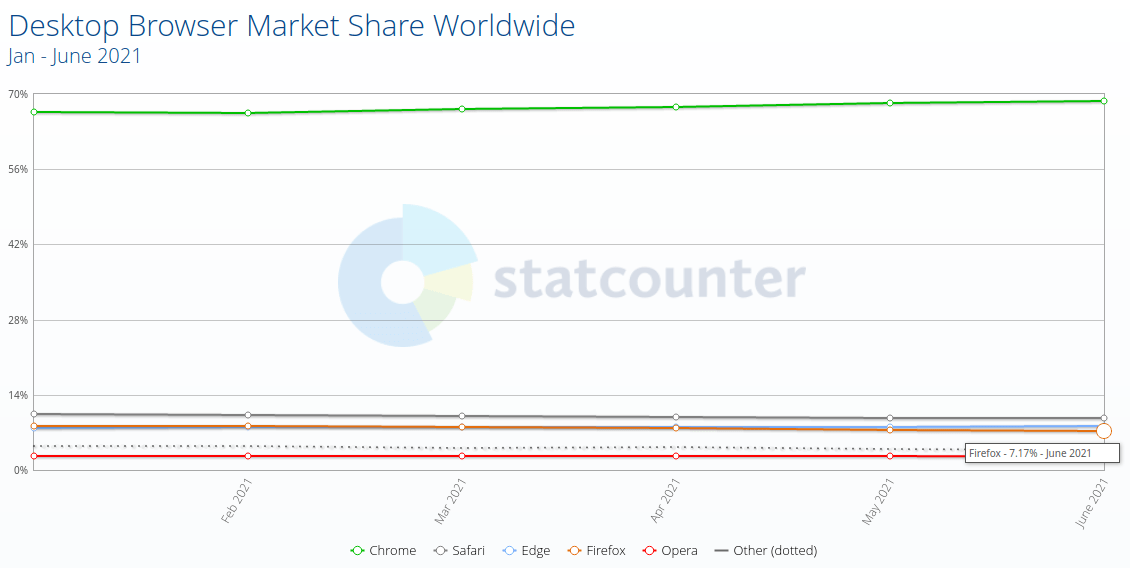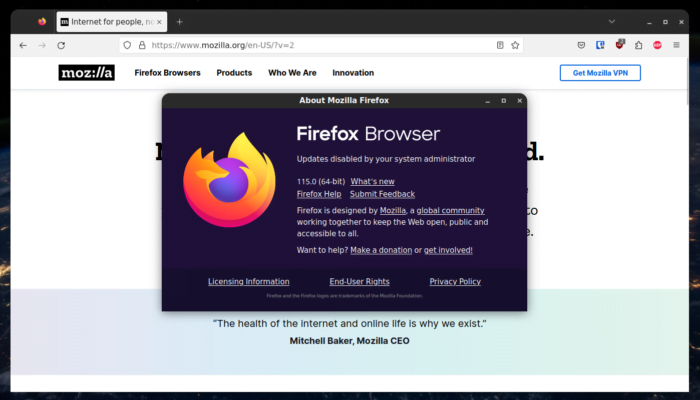Firefox is the default web browser installed on most Linux distributions. It is a well-known browser by Mozilla that respects user privacy by design, and currently remains the only major web browser pushing for open web standards and community interest rather than giant corporations like Google, Microsoft or Apple.
The existence of Firefox is important for the open source community. Both to prevent the monopoly of these corporations on the web and also to ensure a free and open source web browser (and engine!) remains accessible for end-users.
However, Firefox has been recently struggling on many different fronts and on a number of issues and topics. We have covered a story in October, 2020 where Mozilla’s CEO was found to be getting a large $2.4M annual salary, while 25% of Mozilla’s workforce was let go because of financial issues at Mozilla. And yet, Mozilla is promoting initiatives to fight political ads, misinformation and “promote diversity” rather than fixing its own problems.
Today, there is another issue to discuss, which is the browser’s marketshare.
Just since the beginning of 2021, and according to StatCounter, Firefox may have lost up to %12 of its userbase. In January, Firefox marketshare was 8.1% of worldwide desktop usage, but at the end of June, it became 7.17%, which indicates that the browser has lost a large portion of its userbase in a matter of 6 months:

StatCounter uses the following methodology to provides these statistics:
In other words we calculate our Global Stats on the basis of more than 10 billion page views per month, by people from all over the world onto our 2 million+ member sites.
StatCounter FAQ
Different statistics sources may provide different numbers. W3Counter statistics show that Firefox had a 4.1% marketshare in January, 2021, and that it shrank to 3.3% in June. Hence, Firefox may have lost 20% of its userbase so far in 2021 according to this data source.
This situation, sadly, is not expected to get better. The new Firefox design introduced in version 89 seems to have pissed many users off the browser, and subreddits such as /r/Firefox are full of complaints about the browser and its issues on different websites.
On the same subreddit, around 49% of users said that they prefer older user interfaces of Firefox over the new Proton interface design:

The same StatCounter statistics suggest that Microsoft Edge browser now has a marketshare of 8.1% worldwide, which means that the new browser was able to beat Firefox in just one year since its initial release by Microsoft.
Of course, this could be due to many different factors; such as the huge marketing for it by Microsoft, and including it by default in the updated versions of Windows 10, and nobody was expecting Mozilla’s efforts to match that of Microsoft.
However, Mozilla’s situation is concerning because there doesn’t seem to be any core change in its policy toward any of these challenges. Its heavy investment in politics, social movements and other side issues is not paired with the same investment in making the browser better for its users day by day.
All of these statistics, by the way, are of course for the desktop platform only. Firefox on mobile is almost non-existent; with only 0.51% of global marketshare, with other browsers such as Samsung’s default web browser, UC browser and Opera having more marketshare than it, despite being much smaller in age and efforts.
Firefox is an important piece in the open source software ecosystem. However, these monthly news are signs of a nearby death if no measures are seriously taken to address the decreasing userbase each day.
Sidenote: FOSS Post has been featured in the “Top 20 Open Source Blogs to Follow in 2021” by FeedSpot.
FOSS Post is a high-quality online magazine about Linux and open source software. With a team of professional writers from all over the world, we bring you the latest articles, analysis and reviews related to open source.
Articles published with this account are written as a collaborative effort between writers. You can email us at contact@fosspost.org











